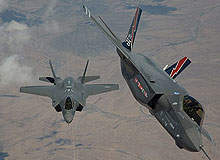
Anyone following the progress of the joint strike fighter (JSF) programme will be familiar with the roles played by prime contractors Lockheed Martin, Pratt & Whitney and GE-Rolls-Royce, but what has perhaps received less attention is the vital contribution to the project made by the cohorts of specialist SMEs around the world.
The $300bn project is being funded by nine partner nations, with different levels of financial commitment. In decreasing order of commitment, the prime customer is the US, with the UK as level 1 partner, Italy and the Netherlands as level 2 partners, while Australia, Canada, Denmark, Norway and Turkey are participating at level 3.
Partnership on the pedestal
Partnerships allow national SMEs to bid for work, and the experiences of those in two of the partner countries – Australia and Canada – show just how valuable this participation is to their aerospace and defence industries.
So far, Australian industry has won more A$200m (US$178m) in JSF contracts, more than half of which have gone to companies in the state of Victoria. Most of those Victorian firms are SMEs, and their involvement confers benefits that are more than financial.
See Also:
For example, Adacel is supplying a speech recognition system that will allow JSF pilots to control many cockpit functions using voice commands alone; it has a workforce of about 160. And according to its manager of Australian operations George Watts, "Being selected for this programme has given Adacel instant credibility in the speech recognition domain, opening doors to meetings that were previously closed.
How well do you really know your competitors?
Access the most comprehensive Company Profiles on the market, powered by GlobalData. Save hours of research. Gain competitive edge.

Thank you!
Your download email will arrive shortly
Not ready to buy yet? Download a free sample
We are confident about the unique quality of our Company Profiles. However, we want you to make the most beneficial decision for your business, so we offer a free sample that you can download by submitting the below form
By GlobalData"The contract has contributed significantly to Adacel’s reputation as a leading player in the development of speech recognition applications, and has also led directly to contracts for additional aircraft types," he says.
And although Adacel does not expect to see JSF revenue from the software until 2012-13, Watts says the fact that it’s a licence deal means gross margins on the software should be higher than on its typical products. "The outlook for this business segment looks very positive," he says.
Another software SME in Victoria is PHM Technology, whose workforce varies between single and double figures and which has supplied an "enterprise-ready" version of its MADe software suite for modelling, assessing and minimising the impact of failures in complex systems.
"The project is a significant validation of our technology," says the company’s CEO Chris Stecki, "as we are the first technology solution that has been focused on providing the modelling and analysis capabilities specifically required to design and implement prognostics and health management (PHM) solutions.
"The JSF provided the majority of our company revenues during 2007-9," he adds. "We are currently being used to validate PHM capability for a JSF subsystem, and we understand that if this project is successful then MADe could be used to validate/design other JSF subsystems."
Lucrative longevity
This prospect of future JSF work is clearly another key issue. As the programme goes into full production, Victoria-based companies are expected to see an additional A$10bn (about US$9bn) in opportunities.
So why have Victoria-based SMEs been so successful? According to Phil Doyle, manager for aerospace and defence, Europe, with the Victoria Government, "Victoria is the major centre for manufacturing in Australia, accounting for 30% of national manufacturing output, and in many cases these firms are able to provide more innovative solutions because they are smaller and already used to supplying international military aerospace programmes."
A similar cluster exists in Ontario, Canada, where 55 of the 85 JSF contractors are based. According to government figures, Canada has invested about C$168m (US$160m) in the JSF project since 2002, which has returned more than C$350m in contracts.
Two prime examples of Ontario-based JSF contractors are CaseBank Technologies (30 staff) and Integran Technologies (35 staff).
CaseBank has supplied an enterprise software application for guided diagnostics, known as SpotLight, along with knowledgebase development toolset and training, to the three key JSF partners. The company says SpotLight enables engineers to develop the specialised databases needed to capture field experience related to the JSF and its engines, and use it to supplement the diagnostics on board the aircraft.
According to CaseBank’s director of business development, Laurence Esterhuizen, "The prestige that comes from being involved in a project like this is, in a word, incalculable; it’s a huge endorsement of our product and has proved to be a very effective ‘ice-breaker’ with the various branches of the US military."
Riding the wings
Esterhuizen can’t reveal details of CaseBank’s contract, but he does say that the company’s business model is directly related to the number of aircraft in service. "The more aircraft, the more technicians required to support the aircraft. We will be successful if JSF is successful, which appears to be the case. As for timescale, we are already reaping the benefits of our JSF association," he says.
Integran says it can’t disclose contract details either, but its vice-president of business development Rich Emrich does say, "We’re working on two JSF development programmes based on our Nanovate coatings of nanocrystalline metals."
The coatings come in two types – Nanovate CR and NV. The CR variant is a cobalt-based coating intended as a "drop-in" replacement for hard-chrome plating, and has been developed in response to the defence industry’s move away from hard-chrome plating owing to its toxicity. Future work will include coating landing gear on the JSF.
Nanovate NV is a low thermal expansion coating to protect the surface of the carbon composite moulds used extensively on the JSF structure. The technology is currently being scaled up for full commercial deployment, but future application to the JSF will allow a reduction in the cost of "rate" tooling and a speed-up in the cure process, says Emrich.
A view to the future
And for the future, the Canadian Government says, "The work packages available for Canadian companies will not only include the manufacturing and assembly of parts but also servicing, repair, simulation and training, as well as numerous other sustainment activities over a 40-year period. Early estimates show that the opportunities available to Canada on production could total C$12bn (US$11.5bn) through these industrial participation plans."
Despite the relatively low-key nature of some of the smaller SME’s involved, figures totalling C$12bn tell a big story. The ambitious size and scale of the contract highlight the immense value of the smaller fish in the pond – the final test of course will be to see if these fish can fly.





